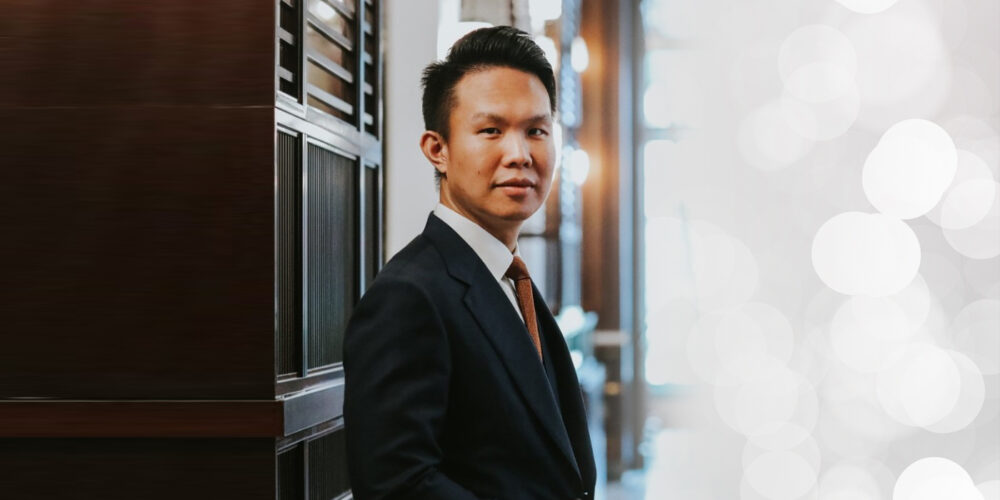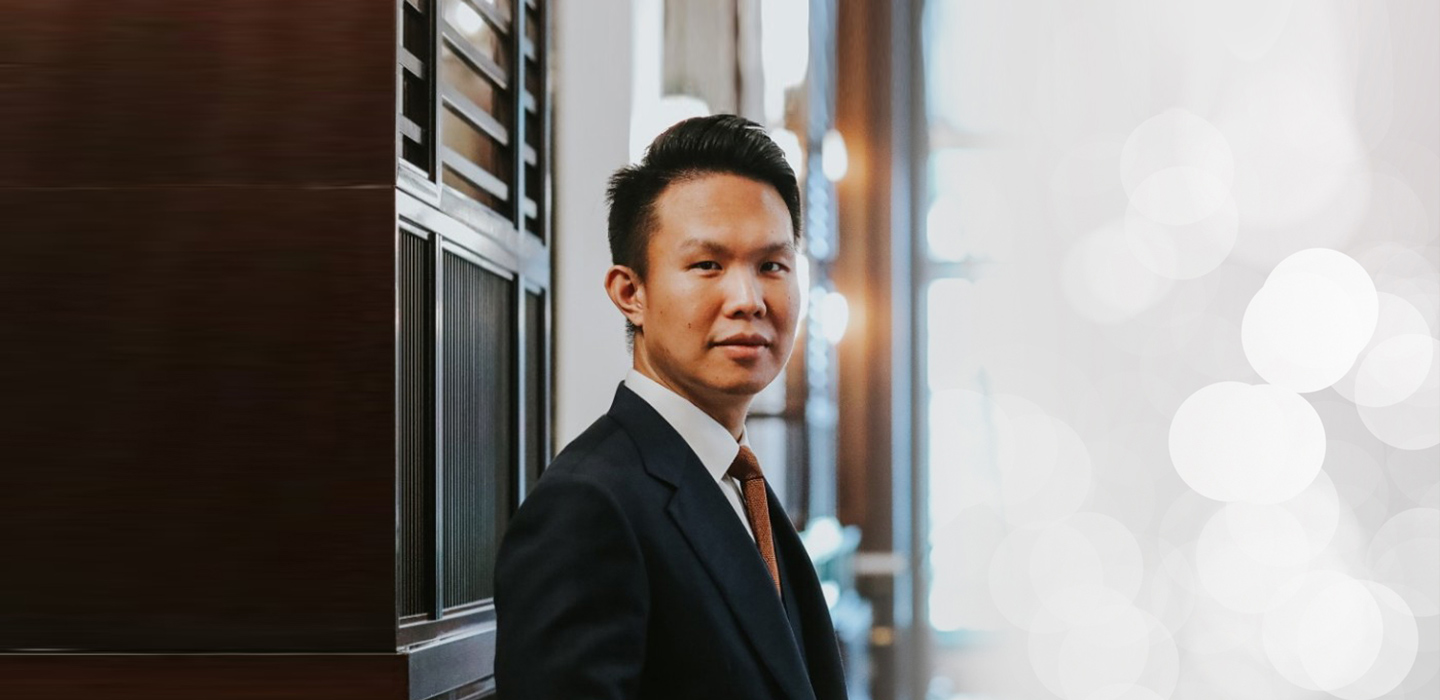Ryan Tan is currently a financial institutions (FI) Coverage Banker in SMBC. His first job was as a Senior Officer in SPRING Singapore (now known as Enterprise Singapore). Following that, Ryan ventured into the private sector as a FI coverage banker in United Overseas Bank (UOB), where he managed a portfolio of FI customers in the Americas, Europe, Middle East and Africa; he then moved on to his present role in SMBC in 2017.
As an undergraduate student, Ryan was an Executive Development Scholar under SPRING Singapore, and was also a recipient of the Italian Ambassadorial Scholarship and placed on the Dean’s List. Moreover, he has also been an active participant in the University Scholar’s Programme, and took up various projects and leadership roles in university.
Q: Could you share more about your role and yourself to our readers? What is a normal working day for you as an FI Banker like?
My role requires me to deal with other banks as clients, marketing a variety of banking products to other institutions. I help other institutions access the capital markets (loans, bonds, equity), global markets & transaction banking services (cash & trade).
Every working day for me is pretty dynamic. My work schedule requires me to travel often, and each work schedule is usually different. Compared with the schedules I have for my overseas tenures, the workload is slightly less demanding in Singapore. Negotiations with clients to see if there are potential opportunities for a sales transaction is also part of my scope of work. Liaisons with our internal stakeholders are also significantly crucial, where we discuss how we can support client requests, and analyse the economic impacts and benefits of potential transactions.
My role as an FI Banker requires me to travel monthly, mostly within the Southeast Asian region. Since a lot of my clients are based in the region, flying over there, meeting them, as well as other financial decision makers, Chief Financial Officers (CFOs), heads of departments and treasurers is a significant part of my job scope.
Q: Please tell us more about your experience at NUS Business School. Was it a passion, stability or the monetary benefits behind that led you to consider an Accountancy degree?
From the age of 16, I knew I wanted to consider something more enterprising and business related as a career. However, I did not have a substantial network or even resources to do so, and I figured that if I joined SPRING Singapore, I would be able to develop my network & connections. Hence, I accepted a scholarship with SPRING Singapore in line with my education in NUS Business School. I wanted a more enterprising career path and the scholarship SPRING Singapore offered was in line with my career goals and purpose.
In my years as a NUS Accountancy student, I completed two internships. My first was with one of the Big 4 companies, KPMG, which satisfied my compulsory Accounting internship requirements for my degree. My other internship was with SPRING Singapore, the provider of the bonded scholarship and hence eventually, my first employer.
My internships with the 2 companies were particularly valuable in preparing me for the working sector. The experience gave me a glimpse into the real work done by professionals, and what the workplace culture was like. More importantly, it gives me a taste of the requirements needed for that job, and other similar jobs within the sector. There was never a better opportunity at the undergraduate level, other than through internships, to get a day-to-day experience of what a job entailed. Another essential skill I developed during my internships is learning to make friends at the workplace. Aside from being technically competent, communication, networking and social skills are very crucial soft skills in the workplace.
Q: What were you aspiring for when you first started out? How was a career at the SPRING Singapore like?
During a particular town hall address in SPRING Singapore, the CEO of SPRING Singapore gave a particularly good piece of advice that still resonates with me. He said that the first ten years of your work life is very important, and determines how far you can go for the rest of your career. This left a deep impression on me, and made me realise that I need to learn as much as I can to go far in my career.
I aspired to learn as much as I could when I first started out. As someone with an entrepreneurial zeal, I opted for a more client-facing, front office role of the organisation. My role in SPRING consisted mostly as an account manager for retail companies in Singapore. As such, it involved a critical understanding of what clients needed – giving them grants, connecting clients with improvement programs, increasing their operational efficiency, process optimisation, and improving their overall branding and strategy.
Being in SPRING Singapore was an enjoyable experience. It was a young organisation and most of my colleagues were fresh graduates around my age. The workplace felt like an extension of school, and public sector work was purposeful. I felt that I was contributing to the future of the economy.
However, working in the public sector has its drawbacks too. Some projects can take very long to bear fruit, for example industry roadmaps take years to develop, and you might not see the results in your lifetime with the company.

Ryan Tan, FI Coverage Banker at Sumitomo Mitsui Banking Corporation (SMBC)
Bachelor of Business Administration – Accountancy (2012)
Q: When do you know it is the ‘right’ moment to move? What made you transition to the banking industry?
It felt like the right time to move when my two-year scholarship was up. The private sector does not view working experience in the public sector quite so valuably, so it would become more difficult for me to move into the private sector the longer I stayed.
Also, I worked with a banker who came into SPRING in the capacity of a professional consultant. The consultant really impressed me, as he was very sharp and agile, and it seemed as if the experience he gained in banking has put him quite far ahead of people in his age. Being ambitious, I wanted to learn more about how to further develop my portfolio competitively and stay ahead of the game in the industry. As such, I started to look into banking as a potential next career.
Q: What were some challenges you encountered, or some distinct differences whilst transitioning from SPRING Singapore to the banking industry?
For the first six months in the banking industry, I had a vague idea of what was going on. Simply put, there were only two skills I took from the public sector into the banking industry. One was the ability for good English communication skills I had honed throughout my time in the public sector, and the other – understanding financial statements. Everything else I did in SPRING Singapore did not prepare me for my job in banking.
Nonetheless, I was very determined to prove my worth and establish my success in the new work environment. For instance, I literally sat in meetings and took down all the details and information discussed during the entirety of the meeting. Even though I probably only understood 30% of what was transpired, I resolved to understand everything and Googled everything I didn’t. And since my boss was a very experienced banker, I tried to shadow him and learn as much as I could from him. It was indeed a struggle, but one I do not regret. Needless to say, I had a strong interest in what I was doing. I didn’t have to fight to wake up every morning as I very much enjoy what I am doing and that keeps me going.
Q: What do you think are the tricks of the trade for people who are interested in FI Banking?
A good banker needs to be able to piece everything together very quickly. You will need to be able to pick up information and understand the bigger picture to be successful in the workplace. Simply put, I think critical thinking and independence are important skills to survive in the banking industry. Beyond that, workplace politics in the banking industry can be challenging to circumvent, and hence being able to get along with people becomes an important soft skill for the workplace.
Being in an environment where everything is fast-paced, very few people will stop to explain what is going on. You must either get it and adapt, or it will be a struggle to survive in the industry. The market is dynamic and unforgiving, clients have very different demands and may not always make sense, internal stakeholders sometimes do not cooperate, the upper management is not keen to hear your problems and only want to see the end profit. Afterall, bankers are here to make money. Amidst all, one needs to be technically competent to even enter the industry. The real challenge in the workplace lies in getting everyone’s interest aligned with yours.
In FI banking, you will need to enjoy being in the center of Finance, and being a part of all the economic events that happen. Being in banking definitely helps in personal investing, and understanding of the world in general. Everything ties in together and it makes a lot of sense being in this industry, at least for me.
Q: What are some of the challenges you foresee in the industry?
The advent of Financial Technology (Fintech) will definitely affect all banks and the financial sector, because it allows them to be more efficient in the way that they do things. For instance, by using cryptocurrency to make a payment, it can be done instantaneously or in a matter of hours. The traditional method of cross border payments take around 1-3 days, whereas cryptocurrency is almost instantaneous.
Learn to develop an appreciation and understanding of the emerging technologies and financial developments that are happening right now – Direct P2P lending, crowdsourcing platforms, digital payments – understanding such technologies will give you a headstart into understanding the future of Finance.
Q: Last but not least, do you have any advice for our readers?
The best piece of advice of advice I can give – look at yourself and ask, what do you want from your career or life? This may be a difficult question to answer. At 19, it is difficult for you to know what you want from the rest of your life. I didn’t have an answer at that age. As such, the best thing you can do for yourself is to try and experience everything. Some people, such as doctors, already have a clue on what they want to pursue in life, they have that kind of conviction and that gives them a headstart in pursuing internships, industry knowledge etc. For most of us, we are still in search of what we truly want. As a student, you have a lot of freedom to experiment and figure out your future ahead of you. Hence, embrace it – never stop learning and trying out new experiences.




